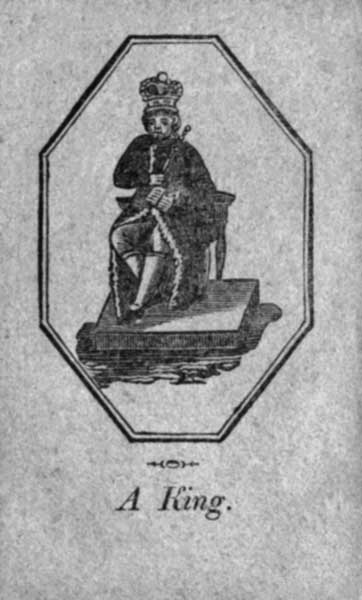
This eBook is for the use of anyone anywhere at no cost and with almost no restrictions whatsoever. You may copy it, give it away or re-use it under the terms of the Project Gutenberg License included with this eBook or online at www.gutenberg.org
Title: The History of Little King Pippin
With an Account of the Melancholy Death of Four Naughty Boys, Who were Devoured by Wild Beasts. And the Wonderful Delivery of Master Harry Harmless, by a Little White Horse.
Author: Thomas Bewick
Release Date: May 12, 2009 [eBook #28768]
Language: English
Character set encoding: ISO-8859-1
***START OF THE PROJECT GUTENBERG EBOOK THE HISTORY OF LITTLE KING PIPPIN***
| Note: | Images of the original pages are available through Internet Archive/American Libraries. See http://www.archive.org/details/historyoflittlek00bewiiala |

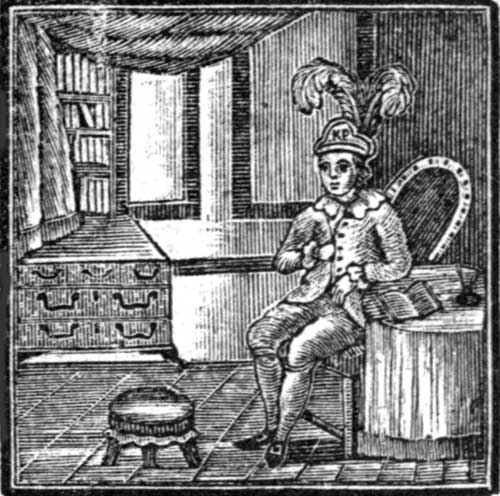
Would you be learned, good, and great,
Our Hero strive to imitate;
For Merit was the only Thing
That made poor Pippin's Son a King.
WELLINGTON:
Printed by F. Houlston and Son.
Price Two-pence.
Peter Pippin was the son of Gaffer and Gammer Pippin,
Who liv'd at the Ivy-house under the hill,
And if they are not gone, they live there still.

This is the house, and a pretty little snug place it is, and there is Peter and his father and mother at the door. Daddy, says Peter, I wish I could have another pretty little Picture-Book, for I have read Mrs. Lovechild's Golden Present so often, that I can repeat it without book. I am very glad to hear it, Peter, says his father, and I wish I could afford to buy you books as fast as you can learn them. I have been saving a penny a week these five weeks, to buy the LADDER to LEARNING for you: well then, says Peter, I have got a penny, which was given me this morning by Miss Kitty Kindness, so that will make sixpence: O dear, I should like vastly to have the Ladder to Learning, and you shall see [Pg 7]how fast I will climb up it; pray give me your fivepence, rather, and I will run to Farmer Giles with it directly, and desire him to bring it down for me, when he goes to Town next week; and away he ran to Farmer Giles, and gave him the money to buy the Ladder to Learning. You can't miss the shop, says Peter, it is just in the midst of the Town, the only place where all the pretty little books are sold: for, though Peter had never been in Town, he knew as well as could be, where his old friend the Publisher lived.
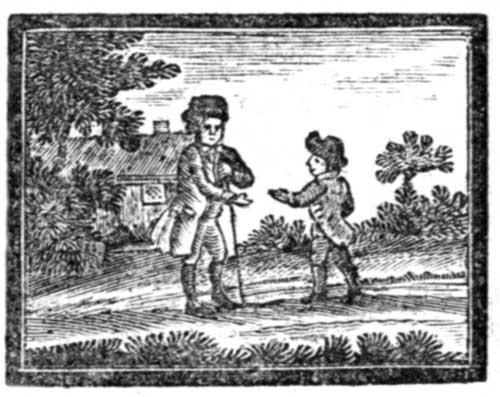
Now a great many silly boys would have spent that penny in apples or gingerbread, or some such trash, and when they had eaten it, what would they have been the better for it? Why nothing at all; but Peter did not lay out his money in such an idle manner; whenever he got a penny, he bought food for his mind, instead of his belly, and you will find he afterwards reaped the benefit of it.
Well, the next week Peter had his new book, and here he sits reading it under the hedge, where he was sent to keep away the crows from Farmer Giles's corn; and you see he neither neglected his book nor his work.
Away, Away, John Carrion Crow,
Your Master hath enow
Down in his Barley Mow.
See how he makes them fly, and as soon as[Pg 8] they are gone, out he whips his little book, and reads till they come back again; for Gaffer Pippin, being but a poor labouring man, could not afford to keep Peter at school; so he was obliged to go out to work, though he was but six years old.
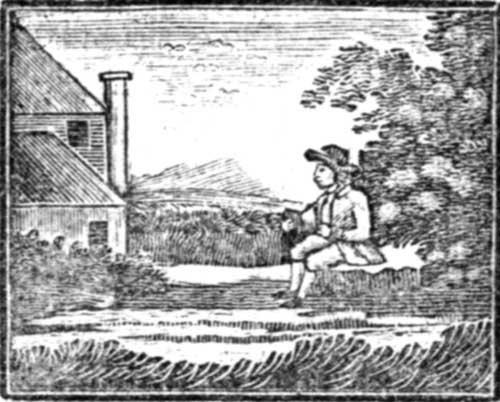
But good fortune is generally attendant on good and virtuous actions, and so it happened to Peter, who was certainly one of the best boys in the whole country; he always did what his father and mother bid him, not only without murmuring, but with pleasure in his countenance; he never went to bed, or got up in the morning, without kneeling down by his bed-side to say his prayers; nor was he ever[Pg 9] known to tell a fib, or say a naughty word, or to quarrel with his play-fellows.
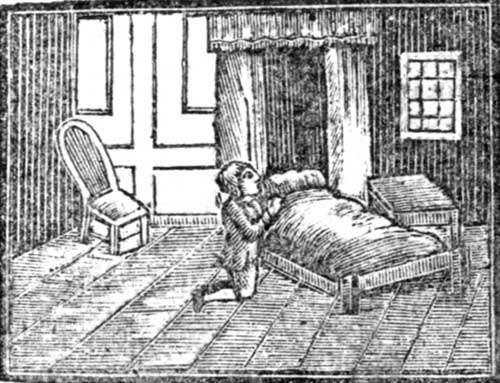
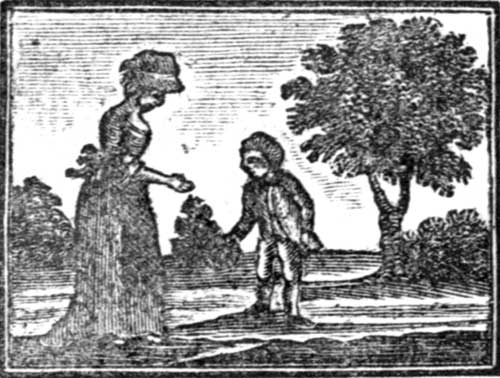
As he was coming home from work one evening, wishing for another new book, he could not help crying, because he had no money to buy one; so being met by Lady Bountiful, whose country seat was but a small distance from the little Ivy-house, she asked him what he cried for? Peter was afraid to tell at first, lest she should be angry with him; but her Ladyship insisted on knowing, and Peter was determined never to tell a fib, so out came the truth. Well, says she, Peter, you need not have been ashamed to tell me, there is no harm in it; dry up your tears. I know you are a good boy, very dutiful to your parents,[Pg 10] and obliging to every one, and since I find you are so desirous of improving your mind, you shall not be deprived of the benefit of education because you are poor; so do you and your father come to me to-morrow morning, and I will see what I can do for you. Peter returned her Ladyship a great many thanks, made one of his best bows, and ran home whistling and singing as merry as a grig. As soon as he got within side the door, Good news, good news, says he, father; you and I are to go to Lady Bountiful's to morrow-morning; I believe her Ladyship is going to put me to school: Peter's head was so full of it, that he scarce slept a wink all the night, and he got up the next morning at four o'clock, put on his Sunday[Pg 11] clothes, washed his face and hands, combed out his hair, and looked as brisk as a bee; and about six o'clock, away his father and he trudged to Lady Bountiful's; as soon as they arrived, they were ordered into her Ladyship's parlour. Well, says she, Gaffer Pippin, since you cannot afford to put Peter to school, I will send him at my own expence: so carry this letter to Mr. Teachum the Schoolmaster, and he will be taken as much care of as if he were my own son. A thousand blessings on your Ladyship, says the old man, I hope God Almighty will reward you for your goodness to my poor boy. It is no more than Peter deserves, says her Ladyship, and as long as he continues such a good boy, he shall not want a friend; but make haste away with him, Gaffer Pippin, or you will not get there before it is dark, for they had near twenty miles to walk: so taking Peter in his hand, they set off towards the school; but they had not walked above a mile or two, before they were overtaken by a gentleman's coach, which stopped as soon as it came up with them, and the gentleman looking out, asked if that was not little Peter Pippin, whom he had heard was such a good boy? Yes, Sir, replied Gaffer Pippin, it is. Indeed, says the gentleman, I thought so, from that good nature so visible in his countenance: pray, how far are you going? To Mr. Teachum's School, Sir, replied Peter. A very fortu[Pg 12]nate meeting, says the gentleman, I am going to the very same place with my two sons, so you shall ride with them in my coach; you need not trouble yourself to go any farther, Gaffer Pippin; I will take care of your son: so thanking the gentleman for his kindness, and bestowing his blessing on Peter, the old man returned home to his work. As soon as Peter was seated in the coach, the gentleman informed him, he was going to a school where he would meet with kind usage and good entertainment: you live very well, says he to his son, don't you, Tommy? Yes, Sir, very well, replied Tommy, we have apple-pie two or three times a week; then I dare say, you know how to spell apple-pie, don't you, Tommy? O yes, Sir, ap-pel-pey. And how do you spell it, Billy? says he to his other son, ap-pel-pye. And how do you spell it, Peter? ap-ple-pie, Sir: that's right, you are a good boy, and there is a sixpence for you; and as for you two dunces, I will take care you shall neither of you have another bit of apple-pie, till you know how to spell it; and he was as good as his word; for though all the rest of the boys had apple-pie the next day for dinner, neither of them were suffered to eat a bit, because they had not learned to spell it; so they were obliged to sit and look at the rest, like two blockheads as they were.
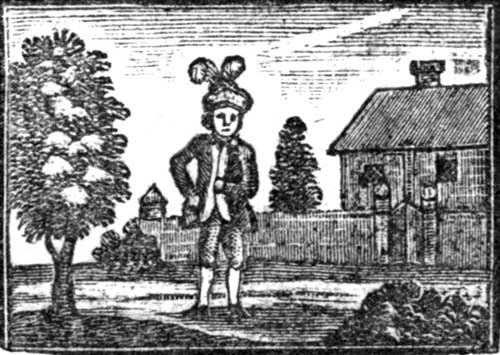
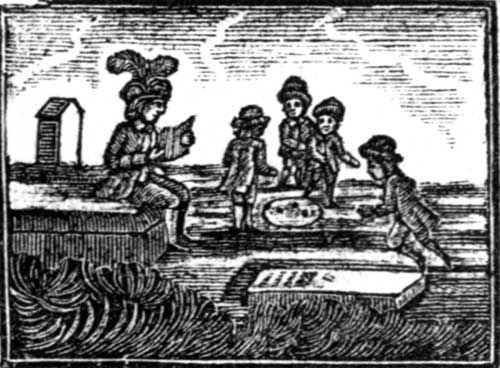
The same affable behaviour which had gain[Pg 13]ed him the esteem of all his acquaintance at home, soon made little Peter equally respected at school; nay, all the good boys were so pleased with the sweetness of his temper, and the good advice which he always gave them, when any quarrel or disagreement happened between them, that they came to a resolution to elect him their King, by the title of the King of the Good Boys, and he was always afterwards called LITTLE KING PIPPIN, (so we shall give him the same title through the remainder of the history:) and all disputes between them, of whatever nature, were referred to his decision; and so great was their respect for their King, and so just were his determinations on these occasions, that they were always sub[Pg 14]mitted to without murmuring or repining: as a badge of distinction for their new king, they made a general subscription, and bought him a fine cap ornamented with a white feather, and round it was engraved in letters of gold, "Peter Pippin, King of the Good Boys." A few days after Peter was chosen King, as George Graceless, Neddy Neverpray, and two or three other boys, as naughty as themselves, were playing at marbles in the church-yard, George Graceless's brother Jack, who was a very good-natured little boy, happened to stop his brother George's marble by accident, upon which he flew into a violent passion, took the Lord's name in vain, called his brother a fool, and made use of a great many other[Pg 15] wicked expressions, which so shocked Little King Pippin, who was sitting on a tomb-stone, just by, reading Mrs. Winlove's Lectures, that he could not forbear speaking to little Graceless; pray, Master Graceless, says he, do you know the consequence of these shocking expressions? did you never read in your Bible, that "Whosoever calleth his brother a fool, is in danger of hell fire?" and don't you know, that one of the commandments says, "Thou shalt not take the name of the Lord thy God in vain; for the Lord will not hold him guiltless, that taketh his name in vain?" Where can you expect to go when you die? Pooh, says little Graceless, don't tell me any of your nonsensical stuff about dying, I have many a good year to live yet; do you mind your reading, and let me alone to my play. Oh fy, oh fy, Master Graceless, says Little King Pippin, God Almighty, if he pleased, could strike you dead, this moment, and however secure you may think yourself, be assured,
There's not a sin that you commit,
Nor wicked word you say,
But in God's dreadful book 'tis writ
Against the judgment day.
There's not a fib that e'er was told,
[Pg 16]Or evil thought arose,
But in that book is safe inroll'd,
As that day will disclose.
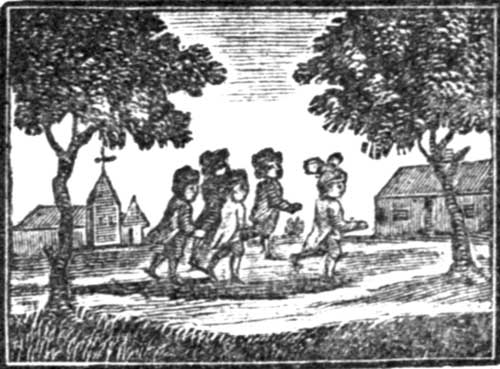
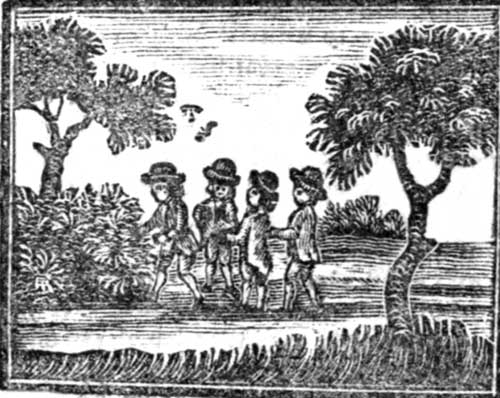
Shah, says he, I am not afraid of that, and away he went singing,
Let us be merry and gay,
And drive away care and sorrow,
We'll laugh and sing to-day,
And talk about death to-morrow,
as thoughtless and unconcerned as if he had done nothing amiss; and now the clock striking two, which was the hour for returning to school, Billy Meanwell, Sammy Sober, Bobby Bright, Tommy Telltruth, and all the rest of the good boys, with Little King Pippin at their head, ran as fast as they could, to try who should get into the school first; but George[Pg 17] Graceless and his companions, being on the other side of the church, saw nothing of their running into school, and their minds were so taken up with play, that they never heard the clock strike, and continued playing so long till they were afraid to go in; so at last they agreed to play truant, and they all went together a bird's nesting. The first nest they found was a poor little Robin Redbreast's, which one of them, whose name was Harry Harmless, and who was not so hard-heated as the rest, (indeed his chief fault was keeping company with these wicked boys,) persuaded them not to destroy; for, says he, a Robin Redbreast is such a pretty innocent bird, that[Pg 18] I can't find in my heart to do it any harm, and it was that good-natured bird that covered over the poor little Children in the Wood with leaves, when they were starved to death: Pooh, says George Graceless and Tom Tiger, what signifies talking such stuff as that, and down they pulled the poor Robin's eggs, nest and all, and left the pretty little bird making such piteous moans, as would have melted a heart of stone; but they turned a deaf ear to his tender cries, and went on destroying every nest they could find, without paying any distinction to the most innocent of the feathered race: at last they came to a turtle dove's nest, which was on the top of a great high tree that hung over a deep river; George Graceless, always the most forward to undertake any dangerous or mischievous exploit, directly pulled off his coat and waistcoat, and climbed up the tree, but just as he got to the top, and was stretching out his wicked hand to take away the turtle dove's eggs, crack goes the limb, and down he fell into the river! oh save me, save me, I shall be drowned; oh, that I had attended to the good advice of Little King Pippin, cried he, and with these words, down he went to the bottom, and was never seen more. The rest of his companions began now to see the folly and wickedness of neglecting their books for idle mischief, and heartily repented that they[Pg 19] had not stayed at school instead of playing truant; but dreading to appear before their master, both on account of their own naughty behaviour, and the melancholy accident which had happened to George Graceless, they strolled about from one field to another, till it was quite dark, and then went and laid themselves under some bushes in an adjacent wood, where they fell asleep; but alas! their sleep was very short, for in less than an hour, they were awakened with such terrible howlings of wild beasts as was scarce ever heard, tigers, wolves, and lions, hunting for their prey, with eyes that glared like balls of fire, rushed by them every instant: in this dreadful situation, expecting every moment to be torn in pieces, Harry Harmless requested them all to betake[Pg 20] themselves to prayer to God Almighty to guard and protect them from the terrible dangers which now surrounded them. But oh, shame to tell, not one of them, except Harry Harmless himself, could repeat, or indeed had ever learned a single prayer; upon which, Harry, justly concluding, that those naughty boys who had so totally neglected their duty to their Creator, could have no claim whatever to his protection, thought he should be in more safety alone than in such wicked company, therefore moved to a distance from them, and kneeled down to prayer by himself; and he had not left them but a few minutes before two monstrous lions came and devoured every one of them: after they had eaten these wicked[Pg 21] boys, they went up to Harry Harmless, but instead of devouring him, as they had the others, they seemed as fond of him as a dam of her young, licked his face and hands with their tongues, and then lay down quietly upon the ground by his side: for God Almighty had heard his prayers, as he always will those of all good little boys and girls, and had converted the natural rage and fierceness of these dreadful beasts into the meekness and gentleness of lambs. When morning came, Harry found he had wandered so far from home, that he could not tell which way to return, but as he was sitting on the side of a bank, reflecting on the danger and folly of keeping such naughty company, and the many wicked ways little boys are too often undesignedly led into by that means, he was surprised by the neighing of a horse, and looking round, there was the prettiest milk-white little creature galloping towards him that ever was seen, with a little bridle on, and a saddle and stirrups on his back, and running directly up to Harry, he fell down on his knees, seemingly to invite him to get on his back; Harry was almost afraid to trust himself on the little horse at first, but recollecting that the same Almighty hand which had rescued him from the paws of the lions, could protect him from every other danger, he mounted on his back, and[Pg 22] he was no sooner seated, but the pretty little thing galloped away with him as fast as he could run, and never stopt till he brought him within a little distance of his home; when dropping down again on his knees, in the same manner as when he took him up, Harry imagining it to be a signal for him to dismount, immediately alighted, and letting go the bridle, the little white horse set off neighing and galloping, as when he first found him, and was out of sight in an instant. As soon as the account of the unhappy death of George Graceless and his companions was made known to their master, he was obliged to dispatch a messenger to inform their parents, and the shocking news had such a melancholy effect[Pg 23] on George Graceless's papa and mamma, that they both died of a broken heart within a month afterwards; and the parents of the other naughty boys were so greatly afflicted with their loss, that it rendered the remainder of their lives miserable. Such were the fatal consequences of these naughty boys neglecting that duty which every one owes to his Maker; and which, above all things, should never be forgotten; for, had they learned their prayers, and said them every evening and morning, they would not have been at a loss to have repeated them when they were surrounded by the wild beasts; and then, no doubt, God Almighty would have saved them, as well as Harry Harmless; and instead of being the means of breaking their parents' hearts, they might have lived to have been the comfort and support of their old age, and perhaps have become as great men as you will find Little King Pippin did.

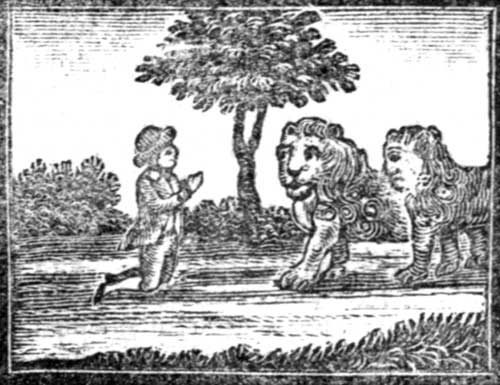
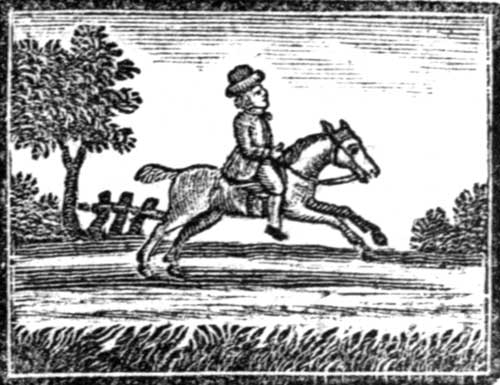
As Little King Pippin grew in years he rose in the esteem of every one who knew him, and his acquaintance was courted by all the good boys in the school, who frequently invited him, at the request of their parents, to spend the holidays with them. Among others, he went one Christmas with the son of Sir William Worthy, a wealthy London merchant. This gentleman, in whom merit always found[Pg 24] a friend, was so highly pleased with the engaging affability of King Pippin's disposition, as well as the great proficiency he had made in the several branches of learning, that he thenceforward took him under his protection, and as soon as he arrived at a proper age, placed him in his counting-house, in which situation be conducted himself so much to Sir William's satisfaction, that, having occasion to send out a person to superintend some plantations which he possessed abroad, King Pippin was fixed on for that purpose. A ship being provided, and every thing in readiness for the voyage, after taking a most affectionate leave of his parents and friends, he set sail for these plantations, which were situated in one of the West India[Pg 25] islands. About a fortnight after their departure, they had the misfortune to lose the Captain's son, a little boy about eight or nine years of age, who fell from the ship's side, when she was under full sail, and was drowned. This melancholy accident is another striking instance of the unhappy consequences of children's disobedience to their parents. The little boy, here alluded to, used frequently to get on the outside of the ship, and let himself down by a rope to paddle in the sea; he had been several times detected by his papa, in playing those frolics; and as often reproved for it, and warned of the danger, but to little purpose; for he was one of those headstrong undutiful children (of whom I fear there are too many) who, as soon as they are out of their parents' sight, forget the good advices and prudent cautions which have been given them, and pursue each idle fancy that enters their heads, without once considering either the folly or danger of it, till they are convinced, by fatal experience, that their parents are much more capable of judging what is proper for them than they are for themselves.
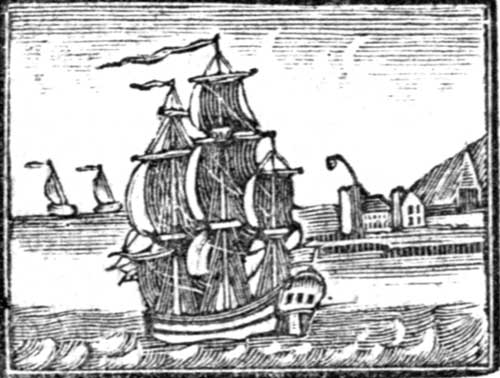
After this accident, they proceeded on their voyage for several weeks, with very favourable weather, and had got so near their destined harbour, that they expected to have made it the[Pg 26] next day, but in this they were unhappily disappointed; for about ten o'clock in the evening they were overtaken by the most violent storm that the oldest sailor on board had ever remembered. The waves, which broke mountains high over the ship, washed several of the sailors overboard, and the rest were so dispirited and fatigued, that they were obliged to let the ship drive at the mercy of the wind and waves.
The next morning, as soon as it was light, they perceived that the ship was carried towards the land with the greatest rapidity; and, as they every moment expected, about nine o'clock she struck upon a rock; the boat was immediately hoisted out, and every one on board crowded into her, except King Pippin, who imagining, that being overloaded, she could not possibly reach the shore, preferred remaining on the wreck. A very short time convinced him, that his suspicion was too well grounded; for before the boat was out of sight, she overset, and every one on board perished.
In this dangerous situation, expecting that the ship would go to pieces every moment, he continued till the afternoon, when the storm began to abate, and the sea became tolerably calm, and by the ebb of the tide the ship was[Pg 27] much nearer the land than when she first struck. King Pippin now conceived hopes of gaining the shore, by means of a raft which he had constructed in the best manner he could; and, furnishing himself with such things as he thought might be useful to him on shore, he let down his raft into the sea, and placing himself on it, began to paddle towards the land; he had proceeded about a mile with great difficulty, when a sudden gust of wind instantly overset his whole cargo, and he was obliged to swim near a mile farther before he could reach the shore.
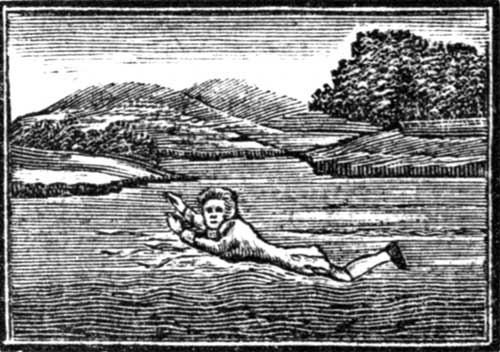
After returning thanks to God Almighty for his great goodness towards him, in preserving[Pg 28] him alone of the whole ship's crew, King Pippin began to consider in what manner he should spend the night, which now drew on apace. Not knowing but there might be wild beasts on the island, he was for some time at a loss how to secure himself, till recollecting he had read, that Robinson Crusoe, when he was cast away on an uninhabited island, had spent the night on the top of a thick tree, he had recourse to the same method, and after the great fatigue he had undergone, slept very soundly till morning, when he descended from his new lodging, and walked several miles about the island, to discover if it was inhabited, but not being able to find the least traces of any human creature, he returned towards the sea-side, in hopes that some of the ship's provisions might be driven on shore; in this too, however, he was disappointed, and hunger obliged him to set about inventing a snare for taking some of the goats, of which he had seen great numbers in his morning walk, but they were so exceeding wild, that it proved a very laborious task, and employed the greatest part of King Pippin's time during his stay on the island; indeed he was sometimes so unsuccessful, that a few vegetables alone were his only sustenance for days together. Some months after he had been cast away on this[Pg 29] solitary place, being one day greatly fatigued, by a fruitless pursuit of some of these goats, he sat himself down on the side of a hill, and looking with desponding eyes towards the sea, he flattered himself that he saw something like a sail at a great distance; after gazing attentively for several hours, without once suffering his attention to be diverted from the wished for object, he was at last, to his unspeakable joy, convinced that it was a ship, and that she was making directly for the land: about five o'clock in the evening, they came to anchor at a small distance from the shore, and having hoisted out their boat, rowed directly into a little creek near the edge of a wood, where King Pippin, having descended from the hill, had concealed himself: as soon as they had landed, perceiving as well by their dress as their language, that they were his countrymen, he discovered himself to them, and was received with the greatest kindness and humanity; and to add to the happiness of his delivery, he found upon enquiry, that they were going to the same island for which he had been originally bound, but had been driven so far out of their course by a violent storm which they had encountered a few days before. Having repaired their vessel, and procured such refreshments as the place afforded,[Pg 30] in about a week they again set sail, and arrived at their destined port without any farther accident.
Immediately upon their arrival, King Pippin took upon him the care of Sir William Worthy's estate, and adopted such prudent regulations in the management of it, as rendered it in a few years almost double in its value; in return for which care and assiduity, he was taken into partnership by Sir William. This good fortune, however, did not fill his mind with that pride and ostentation too frequently attendant on success in life; King Pippin still continued the same engaging respect to his acquaintance, and the same courteous affability to his inferiors, which had marked his character in every sphere of life, nor did it pass unrewarded; for the governor of the island falling a sacrifice to those pestilential diseases which are common to hot climates, the inhabitants unanimously joined in a petition to the King requesting him to appoint King Pippin his successor to the government, recommending him as a person, endowed with every qualification requisite to the happiness of his subjects. Though virtue is generally a poor recommendation at court, in this instance it succeeded, and King Pippin was immediately appointed to the government of the island.[Pg 31]
It would fill a volume to relate the numerous acts of justice, humanity, and benevolence, performed by him during his government; suffice it therefore to say, that under so good a governor, the people enjoyed freedom, plenty, content, and happiness.
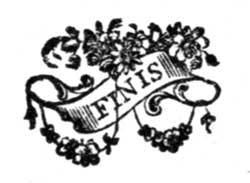
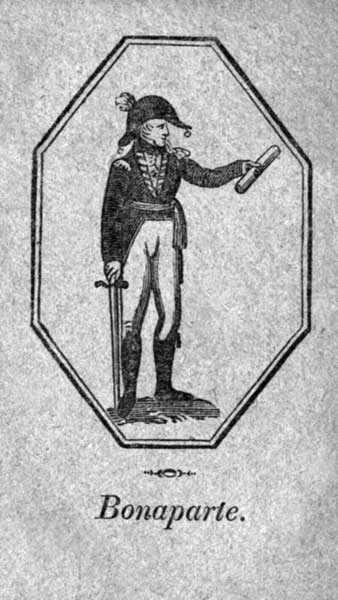
HOULSTONS, PRINTERS.[Pg 32]
***END OF THE PROJECT GUTENBERG EBOOK THE HISTORY OF LITTLE KING PIPPIN***
******* This file should be named 28768-h.txt or 28768-h.zip *******
This and all associated files of various formats will be found in:
http://www.gutenberg.org/2/8/7/6/28768
Updated editions will replace the previous one--the old editions will be renamed.
Creating the works from public domain print editions means that no one owns a United States copyright in these works, so the Foundation (and you!) can copy and distribute it in the United States without permission and without paying copyright royalties. Special rules, set forth in the General Terms of Use part of this license, apply to copying and distributing Project Gutenberg-tm electronic works to protect the PROJECT GUTENBERG-tm concept and trademark. Project Gutenberg is a registered trademark, and may not be used if you charge for the eBooks, unless you receive specific permission. If you do not charge anything for copies of this eBook, complying with the rules is very easy. You may use this eBook for nearly any purpose such as creation of derivative works, reports, performances and research. They may be modified and printed and given away--you may do practically ANYTHING with public domain eBooks. Redistribution is subject to the trademark license, especially commercial redistribution.
*** START: FULL LICENSE ***
THE FULL PROJECT GUTENBERG LICENSE
PLEASE READ THIS BEFORE YOU DISTRIBUTE OR USE THIS WORK
To protect the Project Gutenberg-tm mission of promoting the free
distribution of electronic works, by using or distributing this work
(or any other work associated in any way with the phrase "Project
Gutenberg"), you agree to comply with all the terms of the Full Project
Gutenberg-tm License (available with this file or online at
http://www.gutenberg.org/license).
Section 1. General Terms of Use and Redistributing Project Gutenberg-tm
electronic works
1.A. By reading or using any part of this Project Gutenberg-tm
electronic work, you indicate that you have read, understand, agree to
and accept all the terms of this license and intellectual property
(trademark/copyright) agreement. If you do not agree to abide by all
the terms of this agreement, you must cease using and return or destroy
all copies of Project Gutenberg-tm electronic works in your possession.
If you paid a fee for obtaining a copy of or access to a Project
Gutenberg-tm electronic work and you do not agree to be bound by the
terms of this agreement, you may obtain a refund from the person or
entity to whom you paid the fee as set forth in paragraph 1.E.8.
1.B. "Project Gutenberg" is a registered trademark. It may only be
used on or associated in any way with an electronic work by people who
agree to be bound by the terms of this agreement. There are a few
things that you can do with most Project Gutenberg-tm electronic works
even without complying with the full terms of this agreement. See
paragraph 1.C below. There are a lot of things you can do with Project
Gutenberg-tm electronic works if you follow the terms of this agreement
and help preserve free future access to Project Gutenberg-tm electronic
works. See paragraph 1.E below.
1.C. The Project Gutenberg Literary Archive Foundation ("the Foundation"
or PGLAF), owns a compilation copyright in the collection of Project
Gutenberg-tm electronic works. Nearly all the individual works in the
collection are in the public domain in the United States. If an
individual work is in the public domain in the United States and you are
located in the United States, we do not claim a right to prevent you from
copying, distributing, performing, displaying or creating derivative
works based on the work as long as all references to Project Gutenberg
are removed. Of course, we hope that you will support the Project
Gutenberg-tm mission of promoting free access to electronic works by
freely sharing Project Gutenberg-tm works in compliance with the terms of
this agreement for keeping the Project Gutenberg-tm name associated with
the work. You can easily comply with the terms of this agreement by
keeping this work in the same format with its attached full Project
Gutenberg-tm License when you share it without charge with others.
1.D. The copyright laws of the place where you are located also govern
what you can do with this work. Copyright laws in most countries are in
a constant state of change. If you are outside the United States, check
the laws of your country in addition to the terms of this agreement
before downloading, copying, displaying, performing, distributing or
creating derivative works based on this work or any other Project
Gutenberg-tm work. The Foundation makes no representations concerning
the copyright status of any work in any country outside the United
States.
1.E. Unless you have removed all references to Project Gutenberg:
1.E.1. The following sentence, with active links to, or other immediate
access to, the full Project Gutenberg-tm License must appear prominently
whenever any copy of a Project Gutenberg-tm work (any work on which the
phrase "Project Gutenberg" appears, or with which the phrase "Project
Gutenberg" is associated) is accessed, displayed, performed, viewed,
copied or distributed:
This eBook is for the use of anyone anywhere at no cost and with
almost no restrictions whatsoever. You may copy it, give it away or
re-use it under the terms of the Project Gutenberg License included
with this eBook or online at www.gutenberg.org
1.E.2. If an individual Project Gutenberg-tm electronic work is derived
from the public domain (does not contain a notice indicating that it is
posted with permission of the copyright holder), the work can be copied
and distributed to anyone in the United States without paying any fees
or charges. If you are redistributing or providing access to a work
with the phrase "Project Gutenberg" associated with or appearing on the
work, you must comply either with the requirements of paragraphs 1.E.1
through 1.E.7 or obtain permission for the use of the work and the
Project Gutenberg-tm trademark as set forth in paragraphs 1.E.8 or
1.E.9.
1.E.3. If an individual Project Gutenberg-tm electronic work is posted
with the permission of the copyright holder, your use and distribution
must comply with both paragraphs 1.E.1 through 1.E.7 and any additional
terms imposed by the copyright holder. Additional terms will be linked
to the Project Gutenberg-tm License for all works posted with the
permission of the copyright holder found at the beginning of this work.
1.E.4. Do not unlink or detach or remove the full Project Gutenberg-tm
License terms from this work, or any files containing a part of this
work or any other work associated with Project Gutenberg-tm.
1.E.5. Do not copy, display, perform, distribute or redistribute this
electronic work, or any part of this electronic work, without
prominently displaying the sentence set forth in paragraph 1.E.1 with
active links or immediate access to the full terms of the Project
Gutenberg-tm License.
1.E.6. You may convert to and distribute this work in any binary,
compressed, marked up, nonproprietary or proprietary form, including any
word processing or hypertext form. However, if you provide access to or
distribute copies of a Project Gutenberg-tm work in a format other than
"Plain Vanilla ASCII" or other format used in the official version
posted on the official Project Gutenberg-tm web site (www.gutenberg.org),
you must, at no additional cost, fee or expense to the user, provide a
copy, a means of exporting a copy, or a means of obtaining a copy upon
request, of the work in its original "Plain Vanilla ASCII" or other
form. Any alternate format must include the full Project Gutenberg-tm
License as specified in paragraph 1.E.1.
1.E.7. Do not charge a fee for access to, viewing, displaying,
performing, copying or distributing any Project Gutenberg-tm works
unless you comply with paragraph 1.E.8 or 1.E.9.
1.E.8. You may charge a reasonable fee for copies of or providing
access to or distributing Project Gutenberg-tm electronic works provided
that
- You pay a royalty fee of 20% of the gross profits you derive from
the use of Project Gutenberg-tm works calculated using the method
you already use to calculate your applicable taxes. The fee is
owed to the owner of the Project Gutenberg-tm trademark, but he
has agreed to donate royalties under this paragraph to the
Project Gutenberg Literary Archive Foundation. Royalty payments
must be paid within 60 days following each date on which you
prepare (or are legally required to prepare) your periodic tax
returns. Royalty payments should be clearly marked as such and
sent to the Project Gutenberg Literary Archive Foundation at the
address specified in Section 4, "Information about donations to
the Project Gutenberg Literary Archive Foundation."
- You provide a full refund of any money paid by a user who notifies
you in writing (or by e-mail) within 30 days of receipt that s/he
does not agree to the terms of the full Project Gutenberg-tm
License. You must require such a user to return or
destroy all copies of the works possessed in a physical medium
and discontinue all use of and all access to other copies of
Project Gutenberg-tm works.
- You provide, in accordance with paragraph 1.F.3, a full refund of any
money paid for a work or a replacement copy, if a defect in the
electronic work is discovered and reported to you within 90 days
of receipt of the work.
- You comply with all other terms of this agreement for free
distribution of Project Gutenberg-tm works.
1.E.9. If you wish to charge a fee or distribute a Project Gutenberg-tm
electronic work or group of works on different terms than are set
forth in this agreement, you must obtain permission in writing from
both the Project Gutenberg Literary Archive Foundation and Michael
Hart, the owner of the Project Gutenberg-tm trademark. Contact the
Foundation as set forth in Section 3 below.
1.F.
1.F.1. Project Gutenberg volunteers and employees expend considerable
effort to identify, do copyright research on, transcribe and proofread
public domain works in creating the Project Gutenberg-tm
collection. Despite these efforts, Project Gutenberg-tm electronic
works, and the medium on which they may be stored, may contain
"Defects," such as, but not limited to, incomplete, inaccurate or
corrupt data, transcription errors, a copyright or other intellectual
property infringement, a defective or damaged disk or other medium, a
computer virus, or computer codes that damage or cannot be read by
your equipment.
1.F.2. LIMITED WARRANTY, DISCLAIMER OF DAMAGES - Except for the "Right
of Replacement or Refund" described in paragraph 1.F.3, the Project
Gutenberg Literary Archive Foundation, the owner of the Project
Gutenberg-tm trademark, and any other party distributing a Project
Gutenberg-tm electronic work under this agreement, disclaim all
liability to you for damages, costs and expenses, including legal
fees. YOU AGREE THAT YOU HAVE NO REMEDIES FOR NEGLIGENCE, STRICT
LIABILITY, BREACH OF WARRANTY OR BREACH OF CONTRACT EXCEPT THOSE
PROVIDED IN PARAGRAPH F3. YOU AGREE THAT THE FOUNDATION, THE
TRADEMARK OWNER, AND ANY DISTRIBUTOR UNDER THIS AGREEMENT WILL NOT BE
LIABLE TO YOU FOR ACTUAL, DIRECT, INDIRECT, CONSEQUENTIAL, PUNITIVE OR
INCIDENTAL DAMAGES EVEN IF YOU GIVE NOTICE OF THE POSSIBILITY OF SUCH
DAMAGE.
1.F.3. LIMITED RIGHT OF REPLACEMENT OR REFUND - If you discover a
defect in this electronic work within 90 days of receiving it, you can
receive a refund of the money (if any) you paid for it by sending a
written explanation to the person you received the work from. If you
received the work on a physical medium, you must return the medium with
your written explanation. The person or entity that provided you with
the defective work may elect to provide a replacement copy in lieu of a
refund. If you received the work electronically, the person or entity
providing it to you may choose to give you a second opportunity to
receive the work electronically in lieu of a refund. If the second copy
is also defective, you may demand a refund in writing without further
opportunities to fix the problem.
1.F.4. Except for the limited right of replacement or refund set forth
in paragraph 1.F.3, this work is provided to you 'AS-IS,' WITH NO OTHER
WARRANTIES OF ANY KIND, EXPRESS OR IMPLIED, INCLUDING BUT NOT LIMITED TO
WARRANTIES OF MERCHANTIBILITY OR FITNESS FOR ANY PURPOSE.
1.F.5. Some states do not allow disclaimers of certain implied
warranties or the exclusion or limitation of certain types of damages.
If any disclaimer or limitation set forth in this agreement violates the
law of the state applicable to this agreement, the agreement shall be
interpreted to make the maximum disclaimer or limitation permitted by
the applicable state law. The invalidity or unenforceability of any
provision of this agreement shall not void the remaining provisions.
1.F.6. INDEMNITY - You agree to indemnify and hold the Foundation, the
trademark owner, any agent or employee of the Foundation, anyone
providing copies of Project Gutenberg-tm electronic works in accordance
with this agreement, and any volunteers associated with the production,
promotion and distribution of Project Gutenberg-tm electronic works,
harmless from all liability, costs and expenses, including legal fees,
that arise directly or indirectly from any of the following which you do
or cause to occur: (a) distribution of this or any Project Gutenberg-tm
work, (b) alteration, modification, or additions or deletions to any
Project Gutenberg-tm work, and (c) any Defect you cause.
Section 2. Information about the Mission of Project Gutenberg-tm
Project Gutenberg-tm is synonymous with the free distribution of
electronic works in formats readable by the widest variety of computers
including obsolete, old, middle-aged and new computers. It exists
because of the efforts of hundreds of volunteers and donations from
people in all walks of life.
Volunteers and financial support to provide volunteers with the
assistance they need are critical to reaching Project Gutenberg-tm's
goals and ensuring that the Project Gutenberg-tm collection will
remain freely available for generations to come. In 2001, the Project
Gutenberg Literary Archive Foundation was created to provide a secure
and permanent future for Project Gutenberg-tm and future generations.
To learn more about the Project Gutenberg Literary Archive Foundation
and how your efforts and donations can help, see Sections 3 and 4
and the Foundation web page at http://www.gutenberg.org/fundraising/pglaf.
Section 3. Information about the Project Gutenberg Literary Archive
Foundation
The Project Gutenberg Literary Archive Foundation is a non profit
501(c)(3) educational corporation organized under the laws of the
state of Mississippi and granted tax exempt status by the Internal
Revenue Service. The Foundation's EIN or federal tax identification
number is 64-6221541. Contributions to the Project Gutenberg
Literary Archive Foundation are tax deductible to the full extent
permitted by U.S. federal laws and your state's laws.
The Foundation's principal office is located at 4557 Melan Dr. S.
Fairbanks, AK, 99712., but its volunteers and employees are scattered
throughout numerous locations. Its business office is located at
809 North 1500 West, Salt Lake City, UT 84116, (801) 596-1887, email
[email protected]. Email contact links and up to date contact
information can be found at the Foundation's web site and official
page at http://www.gutenberg.org/about/contact
For additional contact information:
Dr. Gregory B. Newby
Chief Executive and Director
[email protected]
Section 4. Information about Donations to the Project Gutenberg
Literary Archive Foundation
Project Gutenberg-tm depends upon and cannot survive without wide
spread public support and donations to carry out its mission of
increasing the number of public domain and licensed works that can be
freely distributed in machine readable form accessible by the widest
array of equipment including outdated equipment. Many small donations
($1 to $5,000) are particularly important to maintaining tax exempt
status with the IRS.
The Foundation is committed to complying with the laws regulating
charities and charitable donations in all 50 states of the United
States. Compliance requirements are not uniform and it takes a
considerable effort, much paperwork and many fees to meet and keep up
with these requirements. We do not solicit donations in locations
where we have not received written confirmation of compliance. To
SEND DONATIONS or determine the status of compliance for any
particular state visit http://www.gutenberg.org/fundraising/pglaf
While we cannot and do not solicit contributions from states where we
have not met the solicitation requirements, we know of no prohibition
against accepting unsolicited donations from donors in such states who
approach us with offers to donate.
International donations are gratefully accepted, but we cannot make
any statements concerning tax treatment of donations received from
outside the United States. U.S. laws alone swamp our small staff.
Please check the Project Gutenberg Web pages for current donation
methods and addresses. Donations are accepted in a number of other
ways including checks, online payments and credit card donations.
To donate, please visit: http://www.gutenberg.org/fundraising/donate
Section 5. General Information About Project Gutenberg-tm electronic
works.
Professor Michael S. Hart is the originator of the Project Gutenberg-tm
concept of a library of electronic works that could be freely shared
with anyone. For thirty years, he produced and distributed Project
Gutenberg-tm eBooks with only a loose network of volunteer support.
Project Gutenberg-tm eBooks are often created from several printed
editions, all of which are confirmed as Public Domain in the U.S.
unless a copyright notice is included. Thus, we do not necessarily
keep eBooks in compliance with any particular paper edition.
Each eBook is in a subdirectory of the same number as the eBook's
eBook number, often in several formats including plain vanilla ASCII,
compressed (zipped), HTML and others.
Corrected EDITIONS of our eBooks replace the old file and take over
the old filename and etext number. The replaced older file is renamed.
VERSIONS based on separate sources are treated as new eBooks receiving
new filenames and etext numbers.
Most people start at our Web site which has the main PG search facility:
http://www.gutenberg.org
This Web site includes information about Project Gutenberg-tm,
including how to make donations to the Project Gutenberg Literary
Archive Foundation, how to help produce our new eBooks, and how to
subscribe to our email newsletter to hear about new eBooks.
EBooks posted prior to November 2003, with eBook numbers BELOW #10000,
are filed in directories based on their release date. If you want to
download any of these eBooks directly, rather than using the regular
search system you may utilize the following addresses and just
download by the etext year.
http://www.gutenberg.org/dirs/etext06/
(Or /etext 05, 04, 03, 02, 01, 00, 99,
98, 97, 96, 95, 94, 93, 92, 92, 91 or 90)
EBooks posted since November 2003, with etext numbers OVER #10000, are
filed in a different way. The year of a release date is no longer part
of the directory path. The path is based on the etext number (which is
identical to the filename). The path to the file is made up of single
digits corresponding to all but the last digit in the filename. For
example an eBook of filename 10234 would be found at:
http://www.gutenberg.org/dirs/1/0/2/3/10234
or filename 24689 would be found at:
http://www.gutenberg.org/dirs/2/4/6/8/24689
An alternative method of locating eBooks:
http://www.gutenberg.org/dirs/GUTINDEX.ALL
*** END: FULL LICENSE ***